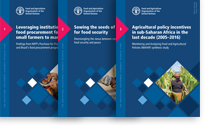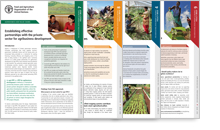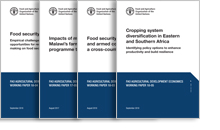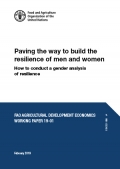Publications
Publication series
Latest publications
Facilitation guide
Manual/guidelines, 2019
In 2018 FAO approved its Corporate Framework to Support Sustainable Peace in the Context of Agenda 2030, committing FAO to a more deliberate and transformative impact on sustaining peace, within the scope of its mandate....
Available in:English
Approaches to working in fragile and conflict-affected contexts
Manual/guidelines, 2019
In 2018 FAO approved its Corporate Framework to Support Sustainable Peace in the Context of Agenda 2030, committing FAO to a more deliberate and transformative impact on sustaining peace, within the scope of its mandate....
Available in:English
FAO resilience analysis report No.18
Technical study, 2019
The Kyrgyz Republic is one of the most climate vulnerable countries in Central Asia. Situated on the north-east, and located– between the Tien Shan and the Pamir mountain systems), it is considered one of the...
Available in:English
FAO resilience analysis report No.17
Technical study, 2019
The IGAD member states are situated in a region exposed to recurrent natural shocks, political instability and characterized by internal and cross-border population displacement. Conflict is the root cause of food insecurity in South Sudan...
Available in:English
FAO resilience analysis report No.16
Technical study, 2019
Borno State, in the northeast of Nigeria, has been reduced from a dynamic and populated rural area into a zone of displacement, hazards and food insecurity due to escalating levels of violence. Since 2009, the...
Available in:English
FAO Agricultural Development Economics Policy Brief 16
Policy brief, 2019
Uganda is one of the largest refugee hosting countries in Africa, with more than 1.1 million refugees. The Uganda Refugee Policy (2006) and the Refugee Regulations (2010) grant refugees wide-ranging rights hinged on a strategy...
Available in:English
Rapport d'évaluation d'impact No. 3
Country case study, 2019
Maradi et Zinder sont situés dans la zone agro-écologique Sahélo-Soudanaise du Niger. L’agriculture et l’élevage représentent les principales activités productives et économiques et emploient 70% de la population. Ces deux régions font partie de celles...
Available in:English
FAO Agricultural Development Economics Working Paper 19-01
Working paper, 2019
Despite significant recent improvements in measuring resilience, there are still relevant gaps in the analysis. One of the relatively unexplored aspects of resilience is whether a gender specific analysis of resilience capacity can become relevant...
Available in:English
Country case study, 2019
Spatial disconnect between cropping system diversification and climate risk. In Zambia, farmers residing in areas with low and medium rainfall risk are more likely to adopt diversified systems than farmers in areas with lower rainfall...
Available in:English
Rapport d’analyse de la résilience No. 15
Country case study, 2019
En Tchad, la vulnérabilité aux événements climatiques extrêmes est amplifiée par la faiblesse des structures administratives (ministères, organismes gouvernementaux et administrations locales), par le manque de ressources humaines et financières et le manque d'efficacité des...
Available in:English













